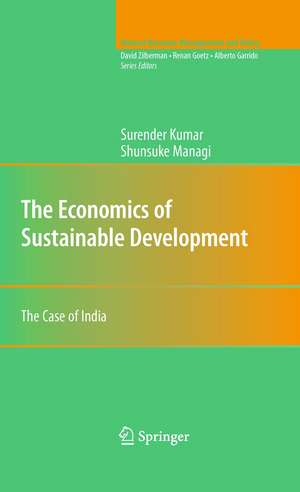The Economics of Sustainable Development: The Case of India: Natural Resource Management and Policy, cartea 32
Autor Surender Kumar, Shunsuke Managien Limba Engleză Hardback – 22 iun 2009
| Toate formatele și edițiile | Preț | Express |
|---|---|---|
| Paperback (1) | 945.30 lei 6-8 săpt. | |
| Springer – 6 dec 2010 | 945.30 lei 6-8 săpt. | |
| Hardback (1) | 951.29 lei 6-8 săpt. | |
| Springer – 22 iun 2009 | 951.29 lei 6-8 săpt. |
Din seria Natural Resource Management and Policy
- 18%
 Preț: 1226.24 lei
Preț: 1226.24 lei - 18%
 Preț: 958.56 lei
Preț: 958.56 lei - 18%
 Preț: 958.38 lei
Preț: 958.38 lei - 18%
 Preț: 1223.74 lei
Preț: 1223.74 lei - 18%
 Preț: 948.29 lei
Preț: 948.29 lei - 15%
 Preț: 641.03 lei
Preț: 641.03 lei - 18%
 Preț: 954.93 lei
Preț: 954.93 lei - 15%
 Preț: 646.43 lei
Preț: 646.43 lei - 18%
 Preț: 955.08 lei
Preț: 955.08 lei - 18%
 Preț: 1233.37 lei
Preț: 1233.37 lei - 15%
 Preț: 651.84 lei
Preț: 651.84 lei - 18%
 Preț: 951.47 lei
Preț: 951.47 lei - 18%
 Preț: 1229.73 lei
Preț: 1229.73 lei - 18%
 Preț: 1229.28 lei
Preț: 1229.28 lei - 15%
 Preț: 643.00 lei
Preț: 643.00 lei - 18%
 Preț: 1237.14 lei
Preț: 1237.14 lei - 15%
 Preț: 645.79 lei
Preț: 645.79 lei - 15%
 Preț: 650.86 lei
Preț: 650.86 lei - 15%
 Preț: 653.14 lei
Preț: 653.14 lei - 18%
 Preț: 1233.52 lei
Preț: 1233.52 lei - 18%
 Preț: 1233.20 lei
Preț: 1233.20 lei - 18%
 Preț: 950.96 lei
Preț: 950.96 lei - 18%
 Preț: 1242.21 lei
Preț: 1242.21 lei - 18%
 Preț: 1222.01 lei
Preț: 1222.01 lei - 18%
 Preț: 1551.11 lei
Preț: 1551.11 lei
Preț: 951.29 lei
Preț vechi: 1160.10 lei
-18% Nou
Puncte Express: 1427
Preț estimativ în valută:
182.05€ • 189.36$ • 150.29£
182.05€ • 189.36$ • 150.29£
Carte tipărită la comandă
Livrare economică 14-28 aprilie
Preluare comenzi: 021 569.72.76
Specificații
ISBN-13: 9780387981758
ISBN-10: 0387981756
Pagini: 297
Ilustrații: X, 312 p.
Dimensiuni: 155 x 235 x 19 mm
Greutate: 0.61 kg
Ediția:2009
Editura: Springer
Colecția Springer
Seria Natural Resource Management and Policy
Locul publicării:New York, NY, United States
ISBN-10: 0387981756
Pagini: 297
Ilustrații: X, 312 p.
Dimensiuni: 155 x 235 x 19 mm
Greutate: 0.61 kg
Ediția:2009
Editura: Springer
Colecția Springer
Seria Natural Resource Management and Policy
Locul publicării:New York, NY, United States
Public țintă
Professional/practitionerCuprins
Macroeconomic Development and the Environment.- Economic Development and Environment.- Environmental Regulations and Compliance in India.- Intergovernmental Fiscal Transfers and the Environment.- Industrial Development and Benefits and Costs of the Environmental Regulations.- Total Factor Productivity of Indian Industry.- Valuing the Benefits of Air Pollution Abatement.- Environmental Regulation and Production Efficiency.- Cost of Environmentally Sustainable Industrial Development.- Win–Win Opportunities and Environmental Regulation: Test of the Porter Hypothesis.- Industrial Water Demand and Shadow Price.- Environmental Productivity, Oil Prices and Induced Innovations.- Environmental Productivity and Kuznets Curve.- A Global Analysis of Environmentally Sensitive Productivity Growth.- Macroeconomic Effects of Oil Price Shocks.- Energy Prices and Induced Technological Progress.- The Road Ahead.
Textul de pe ultima copertă
This book provides a look at the current status and future potential of sustainable development in India. Macroeconomic developments, regional disparity and poverty situation, the trend in natural resource depletion and environmental degradation, trajectory of economic development, and conventional wealth are discussed. A history of environmental regulations and the current state of the environment in India are provided along with the possible reasons for non-compliance of environmental standards in the country. This book studies many different aspects of industries in India from supply and demand sides and efficiency and productivity analyses are provided in detail. Before the liberalization of its economy began in 1991, India had been one of the most over-regulated and closed economies in the world. Market productivity is examined and tests whether the post-reform period shows any improvement in productivity and efficiency in comparison to the pre-reform period. Other subjects are discussed, including the economic value that the urban population of India places on improving the air quality, the cost of sustainable industrial development, industrial water use and analysis of the relationship between the price of oil and the macro economy as it applies to India.
Technological change is vital to maintaining standards of living in modern economies with finite resources and increasingly stringent environmental goals. Successful environmental policies can contribute to efficiency by encouraging, rather than inhibiting, technological innovation. However, little research to date has focused on the design and implementation of environmental regulations that ensure productivity improvements in the face of increasing stringency of environmental regulations. This study models and measures productivity change, which is critical because energy resources are central to sustaining an economy. The traditional issues of measuring productivity change were recast by recognizing that production activity implicitly embodies joint production of market and environmental outputs. Furthermore, the Porter Hypothesis, which states that well designed environmental regulations can potentially contribute to productive efficiency in the long run by encouraging innovation, is tested using firm level data.
Technological change is vital to maintaining standards of living in modern economies with finite resources and increasingly stringent environmental goals. Successful environmental policies can contribute to efficiency by encouraging, rather than inhibiting, technological innovation. However, little research to date has focused on the design and implementation of environmental regulations that ensure productivity improvements in the face of increasing stringency of environmental regulations. This study models and measures productivity change, which is critical because energy resources are central to sustaining an economy. The traditional issues of measuring productivity change were recast by recognizing that production activity implicitly embodies joint production of market and environmental outputs. Furthermore, the Porter Hypothesis, which states that well designed environmental regulations can potentially contribute to productive efficiency in the long run by encouraging innovation, is tested using firm level data.
Caracteristici
Provides the first comprehensive analysis of pollution, resource and efficiency using economic methods in India Will serve a reference guide on the environmental regulation in India and on various energy, natural resource, and environmental issues affecting the country Includes detailed policy scenarios, which provide quantitative assessments of potential benefits that indicate the significance of potential benefits of technological change and well-designed environmental policy Helps understand how successful market and environmental policies can contribute to efficiency by encouraging, rather than inhibiting, technological innovation Includes supplementary material: sn.pub/extras















